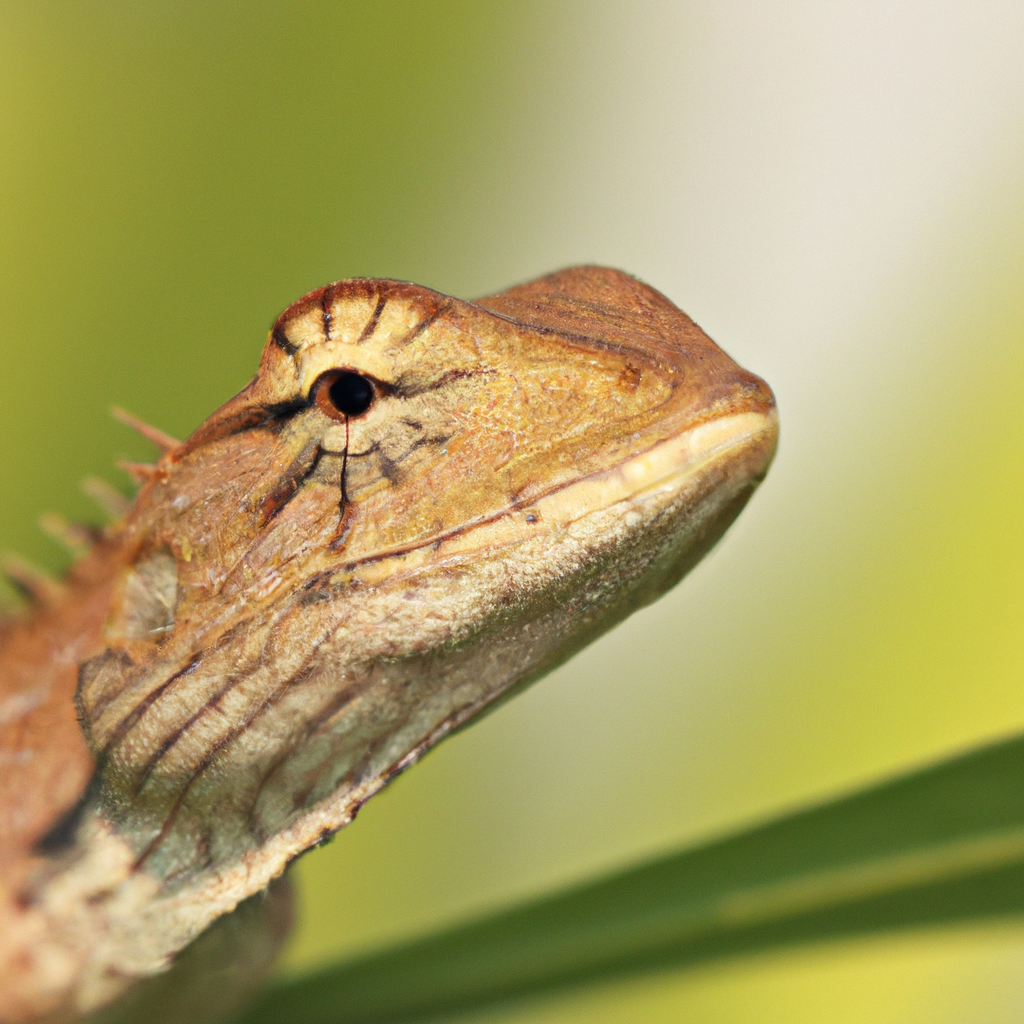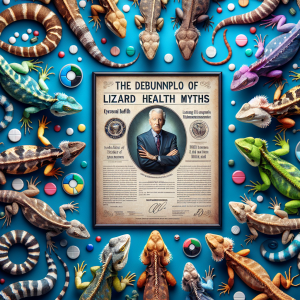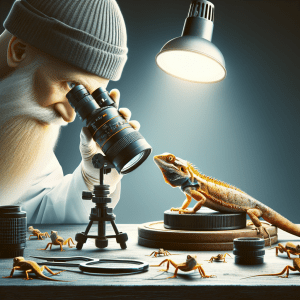Introduction: Exploring Lizard Mythbusting
Lizards are fascinating creatures that have captured the curiosity of people for centuries. However, along with their intrigue comes a plethora of myths and misconceptions that often cloud our understanding of these reptiles. In this article, we delve into the world of lizard mythbusting to separate fact from fiction and uncover the truth behind common misconceptions.
By debunking these myths, we aim to provide readers with accurate information about lizards, their behavior, care requirements, and more. Understanding the reality behind these myths can help foster a deeper appreciation for these unique creatures and ensure their proper care and conservation.
Through engaging storytelling and informative content, we will address some of the most prevalent myths surrounding lizards and shed light on the truth behind them. From debunking myths about lizard behavior to providing expert advice on their diet and care, this article serves as a comprehensive guide for anyone looking to learn more about these fascinating reptiles.
Whether you are a seasoned lizard enthusiast or someone new to the world of reptiles, this exploration of lizard mythbusting promises to be both educational and entertaining. Join us on this journey as we unravel the mysteries surrounding lizards and discover the real facts that lie beneath the myths.
Common Myths About Lizards
Lizards have long been the subject of various myths and misconceptions, often leading to misunderstandings about these fascinating reptiles. In this section, we will delve into some of the common myths surrounding lizards and shed light on the truth behind them.
One prevalent myth about lizards is that they are slimy creatures. In reality, lizards have dry, scaly skin that helps them regulate their body temperature and protect themselves from predators. This misconception likely stems from the association of lizards with other slimy animals like snakes, but the two are distinctly different.
Another myth that circulates is that all lizards are dangerous and venomous. While it is true that some species of lizards, such as the Gila monster or the Komodo dragon, possess venom, the majority of lizards are harmless to humans. Most lizards are shy and will only bite if they feel threatened, with their bites rarely causing any serious harm.
Furthermore, there is a misconception that lizards are dirty or carry diseases. In reality, lizards are quite clean animals that groom themselves regularly. While it is important to practice good hygiene when handling pet lizards, the risk of contracting diseases from them is minimal.
By debunking these common myths and misconceptions about lizards, we can gain a better understanding and appreciation for these remarkable creatures. It is crucial to separate fact from fiction when it comes to lizards to promote awareness and respect for these unique reptiles.
Debunking Lizard Myth #1:
In this section, we delve into debunking a specific lizard myth, shedding light on misconceptions that may have misled many. By addressing and dispelling the myth with factual information and expert insights, readers can gain a clearer understanding of the truth behind popular beliefs about lizards.
Each myth will be examined thoroughly, providing evidence-based explanations to counter the false notion. By presenting scientific facts and research findings, we aim to educate our audience and empower them with accurate knowledge about these fascinating reptiles.
Through this myth-busting exercise, readers will discover the reality of the situation and learn to discern between fact and fiction when it comes to lizards. By challenging misconceptions head-on, we hope to promote a deeper appreciation for these unique creatures and encourage a more informed perspective among enthusiasts and curious minds alike.
Stay tuned as we uncover the truth behind various lizard myths, one misconception at a time. Join us on this enlightening journey as we separate fact from fiction and embrace a newfound understanding of the wonderful world of lizards.
The Truth Behind Lizard Myth #2:
we delve into “The Truth Behind Lizard Myth #2: [Myth Name].” This section aims to provide readers with factual information that dispels a specific myth or misconception surrounding lizards. By examining the myth in question and presenting evidence-based truths, we offer readers a deeper understanding of these fascinating reptiles.
Addressing myths about lizards is crucial in promoting accurate knowledge and dispelling misinformation that may lead to misunderstandings or fear. By shedding light on the truth behind common myths, we aim to educate and empower readers to appreciate and respect these unique creatures.
Through thorough research and expert insights, we will uncover the reality behind Myth #2, offering readers a clear picture of the actual behaviors, characteristics, or traits of lizards that may have been misrepresented in popular beliefs. By presenting accurate information, we hope to enhance readers’ appreciation for lizards and encourage a more informed and positive outlook towards these remarkable animals.
Exploring the truth behind myths not only enriches our understanding of lizards but also encourages a more respectful and compassionate attitude towards wildlife in general. By dispelling misconceptions and promoting factual knowledge, we can foster a deeper connection with the natural world and cultivate a sense of wonder and appreciation for the diversity of life around us.
Top Misconceptions About Lizard Behavior
When it comes to debunking common myths about lizard behavior, separating fact from fiction is essential for understanding these fascinating reptiles. Many misconceptions exist about how lizards behave, which can often lead to misunderstandings and misguided beliefs. In this section, we will delve into the top misconceptions surrounding lizard behavior and shed light on the truth behind these myths.
One prevalent myth is that all lizards are aggressive and dangerous. While some lizard species may exhibit defensive behaviors when feeling threatened, most lizards are not inherently aggressive towards humans. Understanding the specific behaviors and body language of different lizard species can help dispel this misconception and foster a better appreciation for these creatures.
Another common misconception is that lizards are dirty or carry diseases. In reality, lizards are generally clean animals that groom themselves regularly to maintain hygiene. Proper care and husbandry practices can ensure that pet lizards remain healthy and free from diseases, debunking the myth of lizards being unclean or hazardous to human health.
Additionally, the belief that lizards are slimy or sticky to the touch is a widespread misconception. Lizards have dry, scaly skin that helps them regulate their body temperature and prevent water loss. Understanding the unique adaptations of lizards can help dispel this myth and provide insight into their remarkable biology.
By uncovering the truth behind these misconceptions about lizard behavior, we can gain a deeper understanding and appreciation for these remarkable creatures.
Lizard Care Tips: Facts vs. Myths
When it comes to caring for lizards, separating fact from fiction is crucial to ensuring their health and well-being. In this section, we delve into lizard care tips and address common myths that may mislead lizard owners.
One prevalent myth surrounding lizard care is the belief that all lizards require the same type of habitat and diet. The truth is that different species of lizards have varying needs when it comes to their environment, diet, and overall care. It’s essential for lizard owners to research and understand the specific requirements of their pet lizard to provide adequate care.
Another common misconception is that lizards do not need regular veterinary check-ups. While lizards may not require annual vaccinations like dogs and cats, they still benefit from regular health assessments by a reptile veterinarian. Routine check-ups can help detect any health issues early on and ensure that your lizard stays healthy and happy.
Furthermore, some myths suggest that lizards do not require any social interaction or environmental enrichment. In reality, many lizard species are social creatures that benefit from mental stimulation and interaction with their owners. Providing a stimulating environment with hiding spots, climbing structures, and opportunities for exercise can greatly enhance the well-being of pet lizards.
By debunking these myths and understanding the true care needs of lizards, owners can create a nurturing environment that promotes the health and happiness of their scaly companions.
Expert Advice on Lizard Diet
When it comes to caring for lizards, their diet plays a crucial role in their overall health and well-being. Many myths and misconceptions exist regarding what lizards should eat, leading to confusion among pet owners and enthusiasts.
Expert advice on lizard diet emphasizes the importance of providing a balanced and nutritious diet that meets the specific dietary requirements of different lizard species. While some lizards are primarily insectivores, others may be omnivores or herbivores, requiring a varied diet to thrive.
One common myth surrounding lizard diet is the belief that all lizards can survive solely on a diet of insects. While insects may be a staple for many lizard species, it is essential to supplement their diet with other food sources, such as fruits, vegetables, and calcium-rich supplements.
Understanding the dietary needs of your specific lizard species is vital for ensuring their health and longevity. Consulting with a reptile veterinarian or experienced herpetologist can provide valuable insights into the ideal diet for your pet lizard.
Additionally, it is essential to consider factors such as the lizard’s age, size, activity level, and any underlying health conditions when determining their diet. Providing a varied and balanced diet will help prevent nutritional deficiencies and promote optimal health for your beloved lizard companion.
By debunking myths and following expert advice on lizard diet, you can ensure that your lizard receives the proper nutrition they need to thrive in captivity. Proper diet and nutrition are fundamental aspects of responsible lizard ownership, contributing to the overall well-being and happiness of these fascinating reptiles.
Fun Facts About Lizards
Lizards are fascinating creatures with a variety of unique characteristics that set them apart from other animals. In this section, we delve into some fun facts about lizards that will broaden your understanding and appreciation of these reptiles.
Did you know that lizards have specialized vision that allows them to see in a wide range of colors, including ultraviolet light? This exceptional visual ability helps them detect prey, navigate their surroundings, and communicate with other lizards.
Another intriguing fact about lizards is their diverse range of defense mechanisms. Some lizards can detach their tails as a defense strategy when threatened by predators, allowing them to escape while the detached tail continues to wriggle and distract the predator.
Lizards also come in a vast array of sizes, from tiny species like the dwarf gecko measuring just a few centimeters to the massive Komodo dragon, which can grow up to 10 feet in length. This incredible size diversity showcases the adaptability and evolution of lizards to thrive in various environments.
Furthermore, lizards exhibit remarkable agility and speed, with some species capable of running at impressive speeds to catch prey or evade danger. Their agile movements and quick reflexes make them efficient hunters and survivors in the wild.
As you continue to explore the world of lizards, you’ll discover even more captivating facts that highlight the beauty and complexity of these reptiles. Whether you’re a seasoned lizard enthusiast or a curious beginner, learning about these intriguing creatures will deepen your admiration for the wonders of the natural world.
Conclusion: Embracing the Truth About Lizards
In conclusion, embracing the truth about lizards is essential for understanding and appreciating these fascinating reptiles. By debunking myths and misconceptions, we can gain a deeper insight into the behavior, care needs, and unique characteristics of lizards. It is important to rely on accurate information and expert advice when it comes to caring for pet lizards or interacting with them in the wild.
By learning the facts about lizards, we can ensure their well-being and contribute to their conservation efforts. Understanding their dietary requirements, habitat preferences, and natural behaviors can help us create suitable environments for them to thrive. Additionally, dispelling myths about lizards can promote a greater respect and appreciation for these creatures among the general public.
Whether you are a seasoned lizard enthusiast or just beginning to explore the world of reptiles, educating yourself on the truth about lizards can be a rewarding experience. From debunking common myths to uncovering fun facts, there is always something new to learn about these intriguing animals. By staying informed and spreading accurate information, we can help promote a positive image of lizards and encourage others to appreciate the beauty and diversity of the reptile world.
In summary, embracing the truth about lizards is an important step towards fostering a deeper connection with these amazing creatures. By dispelling myths and promoting factual information, we can enhance our understanding of lizards and contribute to their conservation and welfare.
Additional Resources for Lizard Enthusiasts
For lizard enthusiasts seeking to delve deeper into the world of these fascinating reptiles, there are ample additional resources available to expand your knowledge and understanding. Whether you are a beginner looking to learn more about lizard care or a seasoned lizard owner wanting to stay updated on the latest research and trends, these resources can provide valuable information and insights.
Online forums dedicated to reptile enthusiasts offer a platform for individuals to connect, share experiences, ask questions, and seek advice from fellow lizard lovers. These communities often feature discussions on various lizard species, care tips, health concerns, and more, making them a valuable resource for both beginners and experienced reptile keepers.
Lizard-focused websites and blogs are another excellent source of information for those interested in learning more about these creatures. These platforms often publish articles, guides, and updates on a wide range of topics related to lizards, including care, behavior, habitat, and conservation efforts. By following reputable lizard websites and blogs, you can stay informed about the latest research findings, trends, and best practices in lizard care.
Additionally, books and publications dedicated to lizards can provide in-depth knowledge and insights into these fascinating creatures. Whether you are interested in general lizard information or specific species, there are numerous books available that cover a wide range of topics, making them an invaluable resource for anyone looking to expand their understanding of lizards.
By utilizing these additional resources, you can enhance your knowledge, improve your lizard care practices, and connect with a community of like-minded individuals who share your passion for these unique reptiles.




